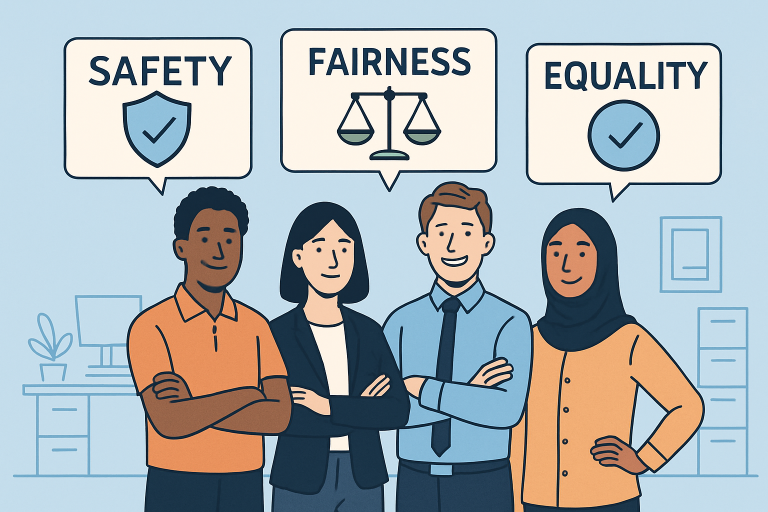Introduction
Knowing your rights as an employee is essential for securing fair wages, safe working conditions, and protection against workplace mistreatment. Every worker should understand key legal protections and how recent laws continue to evolve. If you have questions or concerns regarding your rights on the job, firms like Robinson & Henry employment lawyers can provide guidance and support. Empowering yourself with this knowledge is crucial to advocating for your best interests and ensuring employers abide by the law.
Staying up-to-date with workplace rights can help you respond effectively if issues arise. Knowing what the law requires can make a significant difference in your career and personal well-being, whether it’s wage disputes, unsafe working conditions, discrimination, or employer retaliation. Understanding modern workplace trends—such as new technological monitoring or expanding protections against discrimination—will also help you navigate the evolving employment landscape.
Fair Wages and Overtime Pay
Federal and state laws ensure employees receive at least the minimum wage for every hour worked. For example, in California, the minimum wage as of January 1, 2025, is $16.50 per hour. Overtime protections mean that if you work more than eight hours in a single day or 40 hours in a week, you must be paid time-and-a-half, and working beyond 12 hours in one day entitles you to double-time pay. It’s important to review your state’s regulations, as they can vary, sometimes providing even greater worker protections.
If you suspect wage theft or improper payment practices, documentation is key. Keep records of your hours and pay, and do not hesitate to seek help if you feel your employer may be violating wage and hour laws. The U.S. Department of Labor provides resources for workers facing wage disputes, which can be a useful starting point.
Safe and Healthy Work Environment
Your employer is legally obligated to offer a workplace free from recognized hazards. This duty is central to both federal and state occupational safety laws, which require that workplaces comply with extensive safety regulations. Workers have the right to report unsafe conditions to organizations like the Occupational Safety and Health Administration (OSHA) without fear of retaliation from their employer.
Workplace safety is about more than just accident prevention; it also includes fostering a psychologically safe workplace, free from bullying, intimidation, and stress-inducing practices. Reporting dangerous conditions is protected by law, and remaining alert to health or safety risks is crucial for employee well-being.
Protection from Discrimination and Harassment
Workplace discrimination based on race, gender, religion, age, national origin, disability, and other protected categories is prohibited by multiple federal and state statutes. This means discrimination is unlawful not just in hiring and firing, but also throughout promotions, work assignments, and compensation. Furthermore, employers must be proactive in preventing and addressing harassment—including sexual harassment—to ensure a respectful workplace.
If you experience or witness discriminatory practices or workplace harassment, you can file a complaint with the Equal Employment Opportunity Commission (EEOC) or your state’s fair employment office. Learn more about identifying and reporting harassment from reputable sources like the EEOC’s harassment overview.
Recent Legal Developments
The legal landscape for workers is always evolving. In recent years, the U.S. Supreme Court has increased religious protections in the workplace. Employers must now show substantially increased costs or undue hardship if they wish to deny a religious accommodation request. This makes it easier for employees to observe religious practices, including dress codes or scheduling.
States like New Jersey have passed laws protecting workers from employer coercion on political or religious issues. This ensures workers aren’t compelled to participate in meetings or events where their beliefs may be pressured, further strengthening autonomy in the workplace. Keeping up with these legislative changes safeguards your ability to exercise your rights confidently.
Whistleblower Protections
State and federal laws protect employees who report illegal or unethical conduct within their company. Known as whistleblower protections, these laws shield workers from retaliation—such as firing, demotion, or harassment—when they speak up about wrongdoing. Reporting misconduct helps reinforce accountability and workplace safety by ensuring that violations are addressed appropriately.
If you’re considering reporting misconduct, resources provided by organizations like the National Whistleblower Center can help you understand your protections and next steps.
Privacy and Surveillance Concerns
Technological advancements have increased the prevalence of workplace monitoring, ranging from GPS tracking to wearable technology. While employers may have legitimate business reasons for implementing surveillance, workers remain protected against unjust invasions of privacy and discrimination. The EEOC has cautioned that mandatory use of wearable devices should not result in discriminatory practices, especially for those with health conditions or religious objections.
Staying informed and asking questions about how your data is used or protected can ensure your privacy is respected at work. If you suspect your rights may be violated, consider consulting with an employment attorney or seeking guidance from regulatory agencies.
Conclusion
Understanding workplace rights is fundamental to maintaining fairness, safety, and respect. Being informed helps you recognize and address issues such as unpaid wages, unsafe conditions, harassment, or discrimination before they escalate. Knowing your rights also ensures that your privacy, freedom of expression, and employment benefits are protected under the law. Employees who understand these protections are better equipped to advocate for themselves and support coworkers facing similar challenges. When potential violations occur, consulting a qualified employment lawyer can help clarify your legal options and guide your next steps. Ultimately, knowledge empowers you to create a more equitable and positive work environment, fostering mutual trust, accountability, and long-term professional well-being for everyone involved.
